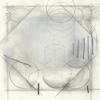Darren Cunningham sounds exhausted. His previous album as Actress, R.I.P, enjoyed a critical consensus that has evaded Ghettoville, the project’s supposed “bleached out and black tinted conclusion.” It’s satisfying, in a way: Cunningham comes across as a stoned, visionary loner, a hashishin popping wheelies on the zeitgeist. Critics seemed to love R.I.P‘s learning curve, but running this kind of cost-benefit analysis on avant-garde music seemed altogether too straightforward of a way to engage with an artist who so rarely goes out of his way to throw his listeners a bone. This is particularly evident in live Actress performances. Long periods go by with little to no non-development, rusty hi-hats marking time you’ll never get back. Certain passages are incoherent in a way that can’t be intellectually recuperated. He might drop “Raven,” a track that passes as a banger in his warped world, but keep it from lifting the audience up by spazzing out on the crossfader. These qualities arise on Ghettoville far more than any other Actress release. It’s withholding not only by design but also due to circumstance—Cunningham may be a conceptualist on the surface, but the experience of his music always comes down to his moods rather than his ideas.
Try applying the reading that lent R.I.P some of its momentum and meaning to Ghettoville and you’ll quickly find it breaks down. You could convey something about how to approach the earlier album by describing it as a grower and not a shower, but Ghettoville digs in its heels and refuses to do either. It is a work of stasis and erasure. Even its moments of uplift—the Detroit house and UK hardcore feelings wending through “Gaze” or the echo jam “Rap”—feel airless and enervating. Cunningham doesn’t even allow himself the time to stretch out and let the lugubriousness reveal its purpose, as he did on the foil-wrapped Silver Cloud EP. We recognize new facets, new sounds on each tour through Ghettoville, but these details are not easily slotted into a meaningful whole.
The dynamic between the album’s first two songs is an object lesson in expectations. “Forgiven” opens in “Voodoo Posse Chronic Illusion” mode—conjuring point-of-view shots from “Terminator” or slo-mo helicopter blades. A gritty hum like frazzled drone a guitar amplifier makes when nothing is being played creates a cavernous sense of space, warmed temporarily by a few smeared notes of bass here and there for structural support. The second-tier backup on “Street Corp.” runs away from the action, however. At the track’s core is an attenuated techno beat that nods to Terrence Dixon’s alienating loops, but the frequencies are utterly hollowed out, as if Cunningham created life just to smother it with a pillow. Bell-like synth lines begin, after a spell, to phase in, but they remain stubbornly out of touch—key-wise, rhythm-wise—with everything around them. Most of the album falls between these poles: coherent and incoherent, meaningful and meaningless, constructive and destructive interference between these different states of being. Like the homeless addicts the album is supposed to conjure, Cunningham is playing some kind of ontological Russian roulette with his music here.
Ghettoville is probably not the end of the line for the Actress moniker, but it does complete a cycle begun on his debut, Hazyville. Compared to the cyborg sheen of Splazsh and the paradisiacal humidity of R.I.P, Ghettoville is more embodied and earthbound even as it is his least outwardly accessible. Like Untold’s Black Light Spiral, Ghettoville finds its creator staring into the fundamentals of his sound, which is to say the nuts and bolts of his poetics and the inky void they exist within. It’s fraught, wan, waif-like, a mostly unrewarding listen. It may not be a masterpiece on its own, but it’s an organic development within a body of work that stimulates our imaginations like precious few others.

















This is the best account of Ghettoville I have read. Great work
‘ontological Russian roulette’ – couldn’t have said it better
I agree with the other comments. It is unusual that a review makes me want to spend time with a record not by gushing over its greatness, but by being at once both critical and thoughtful.